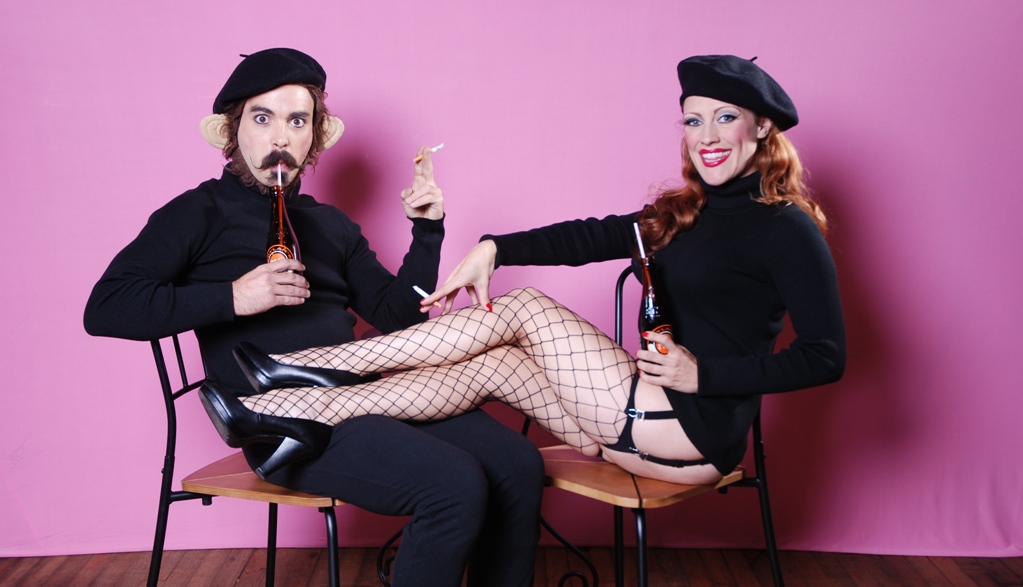Us, Naked: Trixie and Monkey bio pic tumbles into Baltimore
Films about ecdysiasticly inclined acrobats are pretty much non-existent. But Charm City never has been short of extraordinary characters, as can be witnessed this Saturday night, as the Creative Alliance teams with MICA’s Brown Center to present the Baltimore premiere of Us, Naked: Trixie & Monkey – a documentary about home grown burlesque stars Trixie Little and the Evil Hate Monkey. The Baltimore Post-Examiner caught up with Trixie Little earlier this week to talk about the making of the film and the couple’s formative journey.
BPE ~ You’ll be in town this weekend for the Baltimore premier of Us, Naked. Tell us how the film came to be.
Trixie ~ The filmmaker – Kirsten D’Andrea Hollander – was actually one of my college professors at UMBC. We met again some years later when she became one of my yoga students. Kirsten said she was looking for different ideas for a new documentary and was thinking it would have something to do with yoga. I said, “Why don’t you come and see what I do before you get too set on one idea”. She came to one of our shows, and said “I should just follow you guys around”. That’s what happened. We just embarked on this huge thing together.
BPE ~ What year did she start filming Us, Naked?
Trixie ~ Around 2004 or 2005, I guess. She filmed the final footage in 2012 at our wedding. The whole project took about seven years.
BPE ~ I don’t want to spoil the documentary, but could you talk a bit about your background? Are you originally from Baltimore?
Trixie ~ I went to school on the Eastern Shore, but I grew up going to Baltimore for all the fun things. It was a really rural area, where I lived. Then I went to UMBC and stayed in the area.
BPE ~ Is that where you met Monkey?
Trixie ~ Yes. He was born in Baltimore. (Laughing) I wasn’t born in Baltimore, technically.
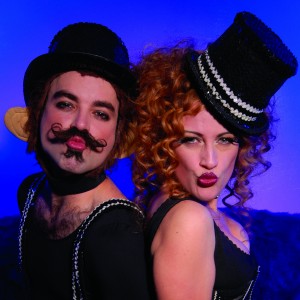
BPE ~ When did you become interested in burlesque?
Trixie ~ I had already been doing burlesque when I started teaching yoga. I had also been doing some circus things. My interest in burlesque really came from being involved with Fluid Movement. We were always researching unusual performance genres, like synchronized swimming and roller skating; things like that. Eventually I just wanted to do more adult things; something a little more risqué.
BPE ~ You and Monkey led the vanguard of the neo-burlesque movement in Baltimore. How did that all unfold?
Trixie ~ When I got started in burlesque, there was nothing going on in Baltimore. I would go up to see shows in New York; shows like the Va Va Voom Room. Basically it was a similar kind of story telling that I had worked on with Fluid Movement but in a shorter format. I think of burlesque as short form theatre really. So it was condensing everything down to a 4 or 5 minute song. We really had the luxury of inventing it as we wanted to.
Monkey and I had been dating at the time, and just for fun, we were taking swing dance classes. We really loved it, and we were great at all the tricks but not so much at the dancing, so we figured we should take all the dancing out and just do all the tricks. That’s basically acrobatics, like circus, so we focused on that. Then we just had to figure out how to add nudity to all the flipping. Flipping and stripping is what we call it.
BPE ~ Adding nudity is always a nice touch – nude cooking, nude gardening…
Trixie ~ It makes everything better!
BPE ~ OK, so you brought what you had seen in New York to Baltimore and started performing. Tell us about the early performances.
Trixie ~ The first performance was at the 14 Carat Cabaret. We did an hour-long show called “Big Trouble for Trixie Little”. When I decided to do burlesque, I didn’t really think about my name. At the time, I had a co-worker who called me Trixie Little, because she would come in and say, “Hey, Trix, whazzup?” And there were times, she was like, “Trixie Little!” ‘cause I was short. I already called Monkey, Monkey. That was my pet name for him.

So we got into this festival in San Francisco, the Second Tease-O-Rama. There wasn’t all this stuff going on like there is now. It was really a small scene then.
In preparation for the festival, we decided to do a whole show, kind of like what I had been doing with Fluid Movement, but adding in the nudity. We wrote whole stories about this Evil Monkey who was going around spreading hate. At the time, I was really influenced by Powderpuff Girls. It just made sense that I was the superhero, and he was the villain. We had one other character, who we called The Sad Guy. Monkey would make him depressed. My magic power was spanking him, so I would spank love back into him and then he would snap out of it. And then I would have to fight with Monkey. We took a snippet of that story to San Francisco, the part of the act where I’m fighting and beating him up and shoving bananas into his mouth.
When we came back, we worked out another one, “Trixie Little Goes Into Outer Space”. We had Jill Medusa as the Evil Drag Queen and devised another story with that one. We wanted to make the act really good, so we shifted gears and started developing a repertoire of more traditional acts like you would do in a variety show.
BPE ~ And this would have been what year?
Trixie ~ The first year that we did “Big Trouble for Trixie Little” was 2002. In 2003, we went to L.A. for the next Tease-O-Rama, and then the first New York Burlesque Festival was in 2004. We went to Exotic World for the first time in 2005.
BPE ~ When you were here, you had a burlesque studio at Load Of Fun.
Trixie ~ We were one of the first tenants in Load Of Fun. We had a big studio there, and I would teach classes.
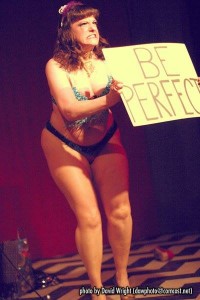
BPE ~ Paco Fish has talked about the influence you had on the local scene with those classes.
Trixie ~ It was really fun. Especially that first group. Shortstaxx, Kay Sera, Paco Fish; it was a great group. We always tried to focus on character-driven burlesque acts; even when doing a classic act, we try to embody some sort of character. Are you being Vivien Leigh or Marlene Dietrich? Really thinking in terms of character is where I am coming from.
We had also attended a physical performers’ conference, called Motion Fest which was produced by Michael Rosman. I can’t remember the year that he stopped producing it, but it was miracle of miracles that it was in Baltimore, because we went to it every year. Basically all the best clowns in the world would come and teach for a week. That’s where we really got our love of comedy; we refined our sense of comedy as physical performers. A lot of our teaching came from that experience.
BPE ~ So you had the school down here…
Trixie ~ It wasn’t so much of a school; I would say a studio. It wasn’t continuous; it was more like when I had time. It wasn’t a regular thing.
BPE ~ There’s nothing about burlesque that’s a regular thing.
Trixie ~ I know, yeah. Some people have dance classes every week, but I would do it for eight weeks and then I wouldn’t do it again for another six months.
BPE ~ But you were teaching and performing on a regular basis.
Trixie ~ I was traveling a lot. Baltimore is kind of a small city, and we realized that when you’re expecting the same people to come out all the time, the most we could do was about one show a month. So we knew we had to start traveling if we wanted to perform more.
BPE ~ At some point, you and Monkey went to New England for circus classes?
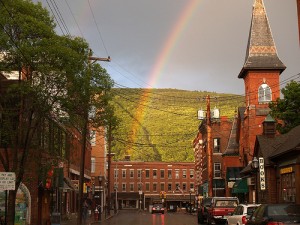
Trixie ~ It was Brattleboro, Vermont. That was for circus school; the first professional circus training program for adults in America.
I had taken aerial – excuse me, dance trapeze class at Gerstung with Jayne Bernasconi. Through her, I found out about the Aerial Dance Festival in Boulder, Colorado. That’s where I first discovered the circus style of doing aerial. I met two identical twins (Elsie and Serenity Smith) who had just stopped touring with Cirque du Soleil and moved back to Vermont. They’d started teaching classes out of a barn in the summer. When they offered this program, we said, ‘This is it.’ This is what we had been waiting for. We realized that we had plateaued and needed to change our bodies and learn how to do things properly. Neither one of us were gymnasts as children; we learned all this stuff as adults. So it took a long time, and we wanted to be there mostly to figure out how to train.
So we moved to Brattleboro. We kept our apartment in Baltimore, but we ended up being there for two years. We would gig in New York every weekend, drive down to Baltimore every couple of months or so. And then, eventually we moved to New York.
BPE ~ Are you still taking classes in New York, or are you teaching?
Trixie ~ I don’t really teach so much anymore, because I’m traveling all the time. And in New York, everything is so competitive, teaching would just require so much of my attention. All my attention is on performing now. New York forces you to do that.
BPE ~ Tell us about Mr. Gorgeous.
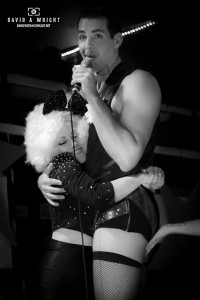
Trixie ~ Eric Gorsuch– Mr. Gorgeous – is one of my best friends. We actually became close at the circus school in Vermont, even though he’s also from Baltimore. All of us ended up moving to New York within a month of each other. Eric went to MICA, and I studied painting at UMBC. We both have a visual sense about things and we have similar senses of humor, so we collaborate well together. Since Monkey’s been touring so much, Mr. Gorgeous and I do hand-to-hand acts together now. Because of his height, we can do higher level acrobatic stunts. Monkey and I are a little more similarly sized, whereas Eric can just throw me around. We call it Tossing the Baby.
BPE ~ Tossing Baby Trixie?
Trixie ~ (laughing) Yes.
BPE ~ What do you miss most about being in Baltimore?
Trixie ~ Leaving was the hardest thing ever. I just cried and cried and cried; I didn’t want to go. I miss the people so much. I miss how crazy and eccentric everyone is. People there have an idea and they just go out and do it. I really miss Load Of Fun a lot. It was a huge loss. I also miss the fun and the craziness. I feel like it is a creative town, and because it has NO pretensions, a great sense of humor; I still love going back there. I get so nostalgic every time I come to Baltimore.
BPE ~ Do you ever get a chance to see any shows with some of your former students?
Trixie ~ Yeah, whenever they come to New York, I try to make sure I see them. I feel like there’s a new wave coming up, too. I haven’t seen so many of them, but I’d like to.
BPE ~ Total Eclipse of the Heart is your signature routine. How did that come about?
Trixie ~ I’ve always had a playlist of songs that I think I want to do acts to. And that was one of my songs I had thought about for a really long time. I was like, “Gosh what can we possibly do that would be as epic as this song?”, but every idea that we had just seemed too kitchy. The song is actually beautiful. I think it’s the most perfectly structured song; it has such an epic build and there’s so much going on. We were trying to do it justice. We didn’t want it to be campy or silly; we wanted it to be serious, in our way. Even though it ends up being kind of comedic; it’s not how we’re playing it. We don’t add extra camp to it.
For about a year, we thought all the ideas we had were stupid. Then we were at Motion Fest – where every night, performers would workshop things they were working on. We’d go back to our room and tinker with it, so that at the end of the week, we had something to show. That’s where we came up with the idea of the flashlights, just starting in darkness, keeping it minimal, like it was a dawning realization of a couple falling in love.
BPE ~ And you’ve won awards for that act.
Trixie ~ Yeah. It’s like a number that honestly never gets old, even doing it all these years. There was one summer when we were doing it twice a night for five nights a week. It still never got old.
BPE ~ It’s a great routine. One last question: Have you ever heard anything from Bonnie Tyler?
Trixie ~ No! I would love that!
* * * * *
Us, Naked: Trixie & Monkey – a new documentary by Kirsten D’Andrea Hollander, will be screened this Saturday April 25 at 7:30pm at MICA’s Brown Center at 1301 Mt. Royal Ave., Baltimore, MD 21217. Running time for the film is 76 minutes. Tickets are $15 and are available at the door, or may be purchased in advance by visiting the Creative Alliance online.
Banner photo credit – Mike Lee

Anthony C. Hayes is an actor, author, raconteur, rapscallion and bon vivant. A one-time newsboy for the Evening Sun and professional presence at the Washington Herald, Tony’s poetry, photography, humor, and prose have also been featured in Smile, Hon, You’re in Baltimore!, Destination Maryland, Magic Octopus Magazine, Los Angeles Post-Examiner, Voice of Baltimore, SmartCEO, Alvarez Fiction, and Tales of Blood and Roses. If you notice that his work has been purloined, please let him know. As the Good Book says, “Thou shalt not steal.”

